That was the theme of the 2023 ISPA Sustainability Conference, which drew a large audience to learn more about the circular economy while engaging with the industry.
About 200 bedding manufacturers, suppliers and retailers gathered at the second annual International Sleep Products Association Sustainability Conference, held Sept. 13-14 in downtown Charlotte, North Carolina.
Topics such as “how to build a culture of sustainability” and “how sustainability can drive growth” attracted a diverse audience, from those just starting their sustainability journey to those already heavily involved in the circular economy.
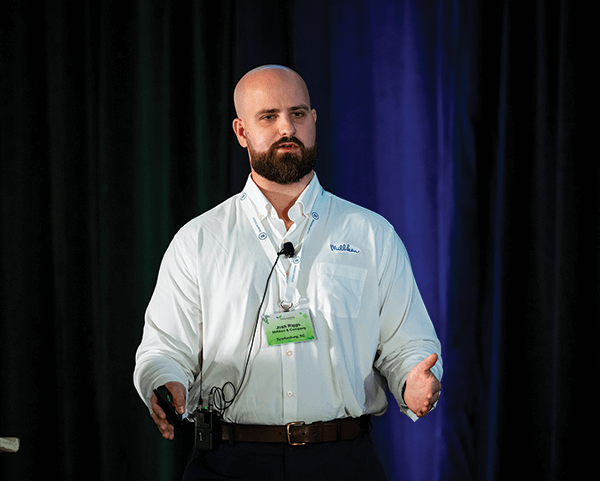
global sustainability, Milliken & Co.
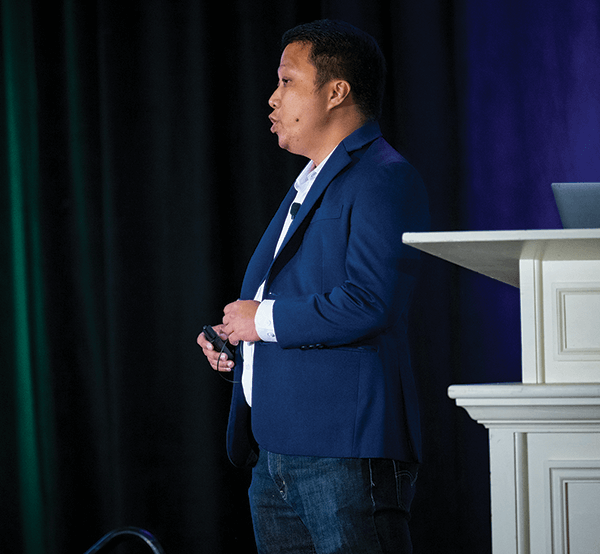
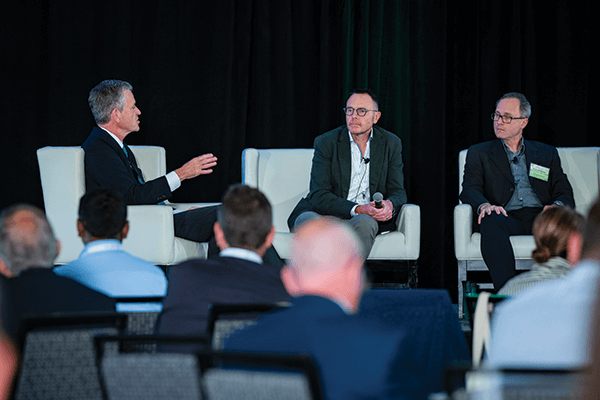
and Ryan McMullan, right, principal consultant for Lean Green Way, who led a presentation,
“Making Product Circularity and Traceability a Reality.”
“Sustainability is a pressing issue for the whole world, especially for the mattress industry,” said Ryan Trainer, ISPA president. “We’re providing a product that the consumer uses on a nightly basis. So there’s real excitement within the industry to look at how we can improve the sustainability of our products, how we can improve the sustainability of our businesses and how we can make our products easier to recycle at the end of their useful life.
“And I think we saw a lot of that here, just this excitement, this buzz about how we can do a better job, how can we learn from our peers and how can we learn from our colleagues in other countries.”
Trainer pointed out that this year’s event attracted an even broader audience than last year.
“We had people who are making the chemicals and raw materials that go into our products. We had the component suppliers, mattress assemblers and retailers,” he said. “We even had recyclers in part of the discussions to talk about how we can build our products better so that we have a lower environmental impact at the end of the day.”
Welcome reception
The event kicked off with an evening cocktail reception, where attendees perused the products of about a dozen exhibitors, including Host Tech, Müller Textil Group, Pocket Coil Recycling and Texas Pocket Springs.
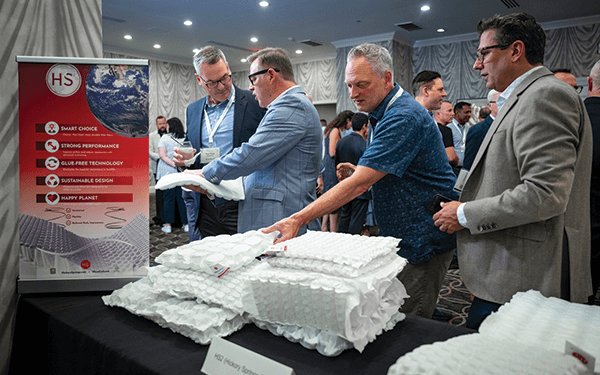
Pocket Coil Recycling chose to exhibit for the first time to get more visibility within the industry. “We just patented our line, and we figured this would be the best conference to come to and put it on exhibit,” said Eric Buck, president of the Florence, Kentucky-based company. “Recycling pocket coils was a huge problem — until now.”
“But we get 100% separation from the fabric and the steel,” Buck continued. “Our blade life is longer than anyone else’s. So, you can make a revenue stream instead of spending all your profits on blades. … We’re also the buyer of the materials; we buy it back.”
Like Pocket Coil Recycling, Harrison Spinks, a manufacturer of finished mattresses and many mattress components based in Leeds, England, seized the chance to display products.
“We were here last November, and we really regretted not having the table because it was important to try and show the U.S. market some of our sustainable products,” said Darren Marcangelo, managing director for Spinks. “Having a table here allows us to present our range of products that we weren’t able to last year.” (Be sure to tune into an upcoming “Take 5” video with Marcangelo about the company’s sustainability efforts.)
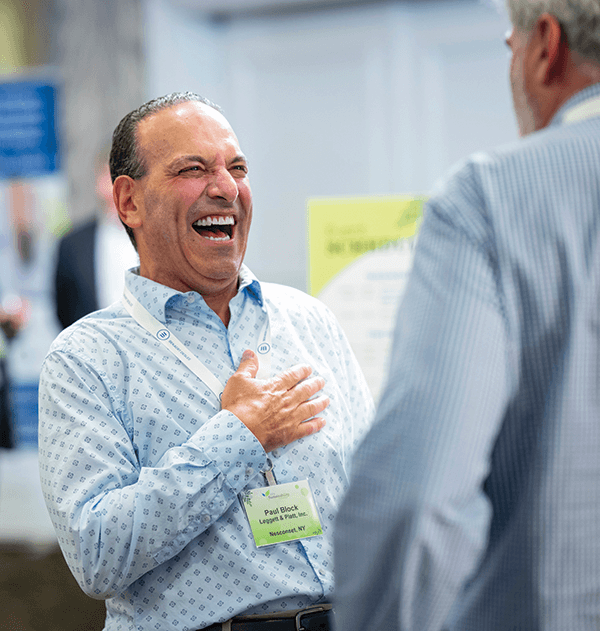
Global Systems Group
“We’re here because, of everything we do within our company, sustainability is always at the start of our decision-making process,” he said. “We make our own machinery, we own our own farm, we make our own spring making equipment, we make our own springs, we weave our own fabric. … Rather than buying products from service suppliers, we can ensure our products are as sustainable as possible.”
Afterward, Marcangelo added that Spinks found the conference to be very beneficial. “This is a journey for the whole industry to take part in,” he said. “None of us have all the answers, but between us, we can make the bedding industry a better place for the planet. We will definitely be back next year.”
Speakers and panels
After a networking breakfast, attendees filed into the ballroom for a slate of knowledgeable speakers. Like the first sustainability conference in 2022, the goal was to raise awareness of sustainability issues and to provide a common vocabulary for people throughout the supply chain to communicate better with one another.
From the first presentation at 8:30 a.m. to the final speaker at 1:45 p.m., each event was well-attended, with a packed ballroom engaging with speakers and asking questions. A key ingredient for the conference’s success: the roster of important, current sustainability topics addressed by experts in their fields, as well as two panel discussions.
Trainer moderated a panel titled “Parts of a Whole: How Manufacturers of Mattress Components Are Innovating for a More Sustainable Future.” And Lisa Donaldson, with performance materials marketing for Covestro, a supplier of chemicals used to make polyurethane foam and adhesives used in the mattress industry, led a retailer panel on “How to Communicate Your Sustainability Story to Retailers and Mattress Shoppers.”
Peter Cooke, co-founder of the Ratio Institute, started the day with the keynote presentation: “Corporate Resilience and Renewal: How Sustainability Can Drive Stability and Growth.”
He immediately put that lengthy title into a simpler “ABC’s of Sustainable ZZZ’s.” That included A) realizing stability and growth can be obtained through operational sustainability, B) the importance of generating baseline data, C) framing a C-suite perspective, and D) a renewed appreciation for the power of disco — tongue-in-cheek for “discover, document, develop and deploy (a small initiative).”
Cooke peppered his presentation with current consumer trends, tips for maximizing employee engagement, the benefits of risk management and stories from his 23 years in the field working with a variety of industries.
“I hope the key takeaway from the presentation is that this industry has an incredible opportunity to communicate and demonstrate to their customers the importance of operational sustainability,” Cook said afterward. “I hope attendees learned this is attainable for them, there is a business case for being more sustainable in operations, and the need for sustainability metrics and data is important.”
While it could take six months to 10 years to make system-level changes, he said, it’s important to get started and stick with it. “What I always tell companies when they tell me that sustainability’s on the back burner, I say, ‘Well, the back burner works, too. It’s not like it’s broken,’” Cooke said. “If you can keep it on simmer on the back burner, then you can keep it alive.”
Getting started
After Cooke’s speech, the presentation titled “How to Build a Culture of Sustainability: Innovation and Design for Circularity” by Josh Riggs, senior sustainability manager at Spartanburg, South Carolina-based Milliken & Co., seemed like a case study on how to implement Cooke’s directive.
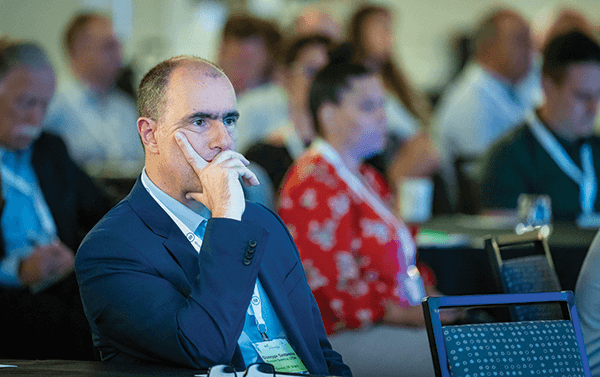
The global diversified manufacturing and material science company has sustainability as a core value. From net-zero targets validated by the Science Based Targets Initiative and World’s Most Ethical honors to multimillion-dollar investments in cogeneration and publicly accessible sustainability reports, Milliken prioritizes sustainability at every level of the organization, he said.
Riggs encouraged the audience to kick-start their sustainability initiatives by setting baselines and targets. “How do you know where you will land if you don’t know what you’re shooting for?” he asked. “You can’t just demand or speak sustainability into existence in your company. You have to treat it like business initiatives, and set incentives and processes, and put people around it to make it happen.”
Riggs said that setting targets is “the fun part.” “This could be big or it could be small. It could be as simple as changing your lighting to LED lights. We did that,” he said. “It’s simple changing lightbulbs, but it is cost effective and sustainability effective, and it’s certainly a way to start that momentum and muscle building toward sustainability.”
Afterward, Riggs stressed that to make a meaningful impact on the planet, companies must have a business plan and a value system that supports sustainability. “The reality is there’s no checkbox or straight path that is going to get sustainability leaders fully operational without support and buy-in at every level of your organization,” he said.
“I hope the audience left realizing you don’t have to have millions of dollars in the budget or set aside new processes that are going to overhaul the way your business operates to make an impact,” Riggs added. “As long as you start with a plan and well-defined targets, commit to taking action and are transparent in your progress (the good and bad), you’re off to a great start.”
Sustainable design
The next presentation, titled “Making Product Circularity and Traceability a Reality,” addressed the European Commission’s recent legislation to introduce digital product passports into the European market. A digital product passport creates a digital twin of a physical product and securely records sustainability-related data throughout a product’s life cycle in a shareable format. Final approval of the regulations is expected in 2024 and implementation is estimated to start in 2026 or 2027.
Stefaan Cognie, co-founder of Ghent, Belgium-based TripleR, shared that circularity is not something that companies will be able to realize by themselves: The reverse logistics, the dismantling and the recycling are all activities that are beyond the scope of mattress makers. All those activities will require them to partner and to connect through an industry standard, he said.
Cognie’s business, TripleR, helps enable circularity in the bedding industry through the digital identification of bedding products, which is linked to a cloud platform to keep all stakeholders connected throughout the lifetime of the product.
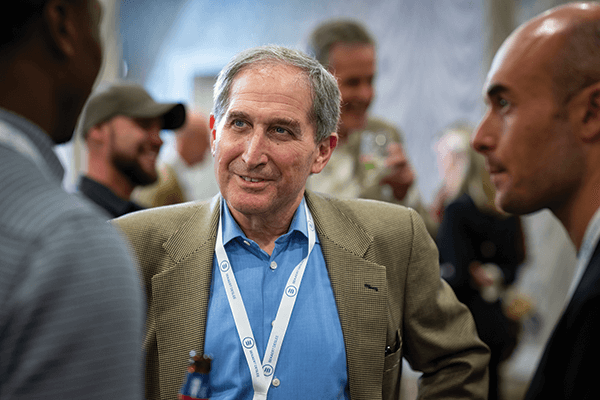
“Circularity starts with designing for circularity,” Cognie said. “A product needs to be designed in a way that it can be unmade at end of life, or that it can be refurbished or repaired. All of this implies that companies will probably no longer grow in volume, but may grow their revenue through other business models and revenues.”
Cognie’s co-presenter was Ryan McMullan, principal consultant at Long Beach, California-based Lean Green Way, who shared that there are multiple methods for traceability. “To start, determine the end audience (such as general consumers versus corporate buyers), what they need and how much complexity they can tolerate,” McMullan said. “Concerns around proprietary information can be addressed, as can interdependent supply chains and competition.”
MRC’s Sleep Products Sustainability Program consultant, McMullan defined the program, called SP2, as a certification for facility operations, as well as a system of processes to promote continuous improvement. MRC offers SP2 training at no cost to eligible mattress manufacturers in California. The program also provides manufacturers with a usable label about the facility where products are made, and access to the logo for promotions, advertising campaigns and consumer awareness.
Ikea example
Finally, Jose Junior Naraval, a materials specialist for foams and textile furnishings for Inter Ikea Group, capped off the day’s presentations, sharing Ikea’s path to circular foam.
Polyurethane foam, a key material in many mattresses, is traditionally sourced from virgin petrochemicals. To help achieve a more circular world, Ikea has committed to using only renewable and recycled materials by 2030. The company is working to develop mattress foam made only with polyols recycled from production waste, post-consumer mattress foam and renewables.
“Ikea is committed to improve our carbon footprint, and we are on the journey to enable 100% circular products, where we only use renewable or recycled materials,” Naraval said. “This is where our sustainability ambition sits. As a company we are not unique in this ambition, but we need to remember that we are a company for the many people.
“We, therefore, need to take on this challenge of material conversion with a low price tag in mind for our customers. We do not want more sustainable products to be available only to the few (with thicker wallets), but to the many.”
For two consecutive years, the ISPA Sustainability Conference has attracted a large audience — inspiration for the future, as Trainer said it may become an annual ISPA function.
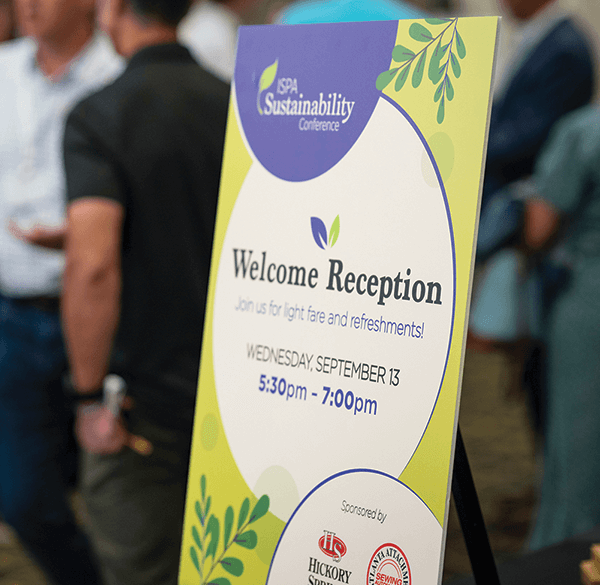
“There are so many good nuggets to come out of this event,” Trainer said. “One is product transparency and accountability. But we also had some fantastic discussions about what we do with the products at the end of their life. We also talked about surveys that the Better Sleep Council just released, discussing the knowledge gap between the manufacturers, consumers and retailers.
“We need to do a better job of explaining, in accurate, honest terms, the sustainability features of our products. And, I think if we do that, we will all be more successful when the consumer buys those products.”




